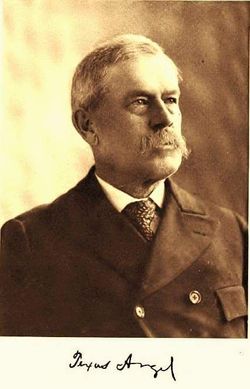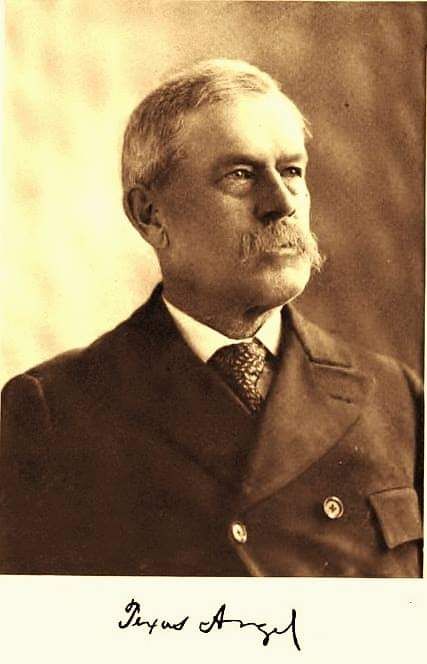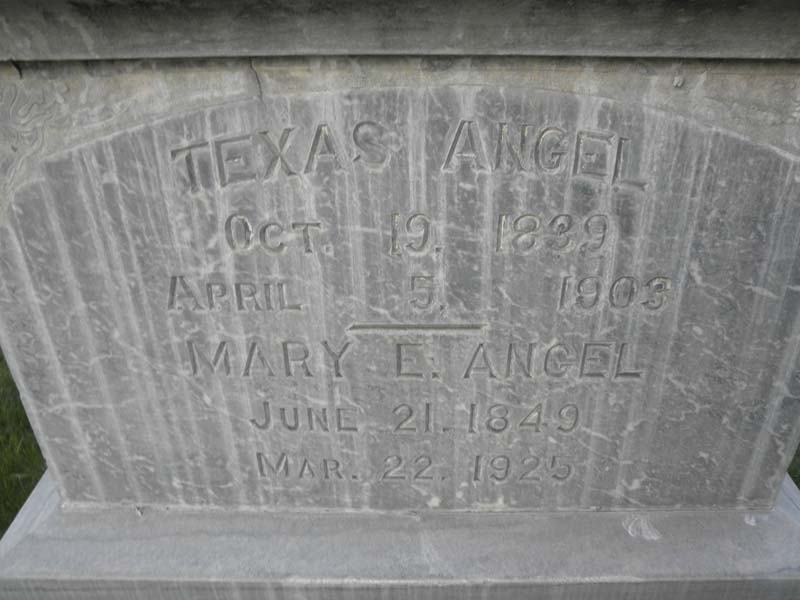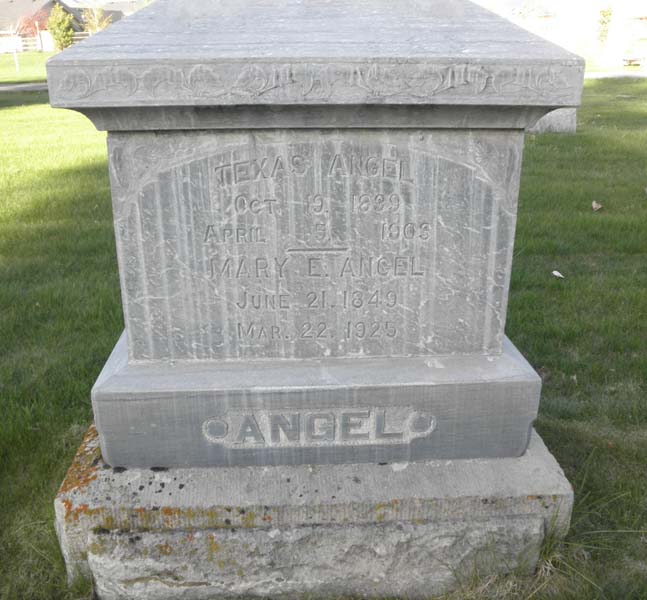Son of William Gardner Angell and Clarissa English
The Hon. Texas Angel of Idaho
"Texas Angel! Gods, what a name!" was the exclamation of a Spokane man as he read the senatorial reports from Boise City and learned that an individual bearing that name was a prominent figure in the race over in Idaho. "What could his parents have been thinking when they named the poor baby?" he continued. "A worse combination could not have been conjured from the imagination."
"Have you never heard of the circumstances under which Mr. Angel received that name?! said Judge John R. McBride, the well-known pioneer of Oregon, Washington, and Idaho. "It happened in this way. Mr. Angel's father was a member of Congress from the Buffalo district of New York, and while in Congress the question of the admission of Texas was a lively issue. He took an active and leading part in the movement for admission and was so enthusiastic over the question that he gave the name of Texas to his son, born at that time. Then only a glamour of romance and adventure hung over the broad region as recently wrested from Mexico, and the elder Angel could not foresee the character which was so soon to attach to the infant state."
Mr Angel is about 60 years of age, has an excellent standing in the southern part of the state, where he is well known, is a successful lawyer, and is a Populist of modernist views. Spokane Spokesman-Review
BIOGRAPHICAL SKETCH IN HISTORY OF IDAHO
TEXAS ANGEL. From the establishment of the town of Hailey, at the beginning of the decade of the eighties until his death in 1905, Texas Angel was one of the foremost citizens and one of the ablest members of the Idaho Bar. Fully a quarter of a century he was closely identified with this one community and left upon at his death an indelible impression so that all citizens appreciated the fact that a good and strong man had passed that way. He stood high in his profession, for many years took an active part in political and civic affairs, and always enjoyed the respect and confidence of the people among whom he lived.
The late Texas Angel was born in Angelica, New York, on October 19, 1839, and was descended from a family that settled in New England soon after the first landing of the Mayflower colony. The founder of the American branch of this name was Nathan Angel, a Welshman who moved from Massachusetts to Providence, Rhode Island, along with Roger Williams, the apostle of religious liberty. The grandfather of Texas Angel was William Angel, and the father was William Gardner Angel, who was born in 1790. In 1792, the family removed to Otsego, New York, where William G. Angel was educated for the law. He was in his time one of the very prominent men in public life. He was twice elected to Congress during the time of President Andrew Jackson, served his locality as county judge, and at one time was a surrogate of Albany County. He was a Democrat in early life, but when the question of slavery became dominant, he joined the new Republican Party, casting his vote for its candidate in 1856. Two years later, in 1858, his death occurred at the age of sixty-nine. He married Clarissa English, whose family was among the pioneers of western New York. She reached the ripe age of seventy-three and became the mother of twelve children, ten of whom reached maturity and gave creditable accounts of themselves.
It is one of the interesting facts of this family history how the Christian name was bestowed upon the late Mr. Angel. His father was one of the warm friends and admirers of Sam Houston, the great military and political leader of Texas during the time of its struggle for independence, and the name Texas was bestowed upon the youngest son in honor of that brilliant figure in the southwest. Texas Angel was educated in the academy of his native town and was twenty-two years old when the war came on. He enlisted on April 22 in Company I of the Twenty-seventh New York Infantry. The regiment went to the front in time to participate in the first Battle of Bull Run, and was afterward in the Battle of West Point, and then in the Peninsula campaign, suffering additional great losses in the battle of Gaines Mills. The Twenty-seventh Regiment was also at White Oak Swamp, guarded the right flank of the Union army at the Battle of Malvern Hill, and soon afterward Texas Angel was taken ill and sent to West Philadelphia Hospital. After a furlough, he rejoined his regiment in time to fight at the second Battle of Bull Run; was a South Mountain, and after the Battle of Antietam was appointed commissary sergeant with the rank of second lieutenant in Company I. A later promotion made him first lieutenant, and during the march from Antietam to Fredericksburg he was made quartermaster of the regiment, an office which he filled until the close of his term of enlistment for two years on May 21, 1863. From that time until May 1864, he was in the recruiting service.
From the east, with its battles and terrific struggles of civil war, Texas Angel went west by way of the Isthmus of Panama, in May 1864, and arriving in San Francisco, began reading law with Samuel M. Wilson, and was admitted to the bar in Sacramento, April 3, 1866. Later in the same year, he returned to his old home in New York, and established a law office at Jamestown, New York; but one year later moved out to Wisconsin, and in Eau Claire practiced his profession for a little more than ten years, half of this time being a partner of Mr. Vilas, a brother of Senator Vilas. He also served in the offices of district attorney and is considered one of the ablest lawyers in that section of Wisconsin.
Because of the ill health of his wife, Mr. Angel was compelled to seek a milder climate, and in September 1877, once more established himself in California, San Francisco, where he practiced law for five years. Then, in 1881, he made the change of residence which brought him to what proved his permanent home at Hailey, a town which was then composed principally of tents and which had been laid out only a few months before. The recent gold discovery on Wood River was an important factor in the creation of this town and gave its promise of becoming an important center. Texas Angel became one of the pioneer lawyers of the time and gave his energy and ability to realize the ambitions of its founders and early settlers.
For eight years of his early practice, Mr. Angel was associated with Judge Sullivan and thereafter continued to follow the law until the date of his death. From the beginning of the war until 1892 he was a consistent supporter of the Republican Party, and then took issue with his party on the money question and was allied with the Populists during their continuance in American politics. Fraternally he was made a Master Mason at Eau Claire, Wisconsin, in 1869, and was also affiliated with the Ancient Order of United Workmen.
At Eau Claire, Wisconsin, on May 25, 1870, Texas Angel married Miss Mary E. Goodrich. Mrs. Angel still resides at Hailey, which has been her home for more than thirty years, and in which she has the esteem and regard of one of the pioneer women. She is the mother of three children. Richard M. Angel, the oldest, is sketched in the following paragraphs. The son Floyd is a civil and mining engineer formerly in the service of the government in the reclamation service in Arizona and now connected with the Idaho Construction Company in work near Weiser, Idaho. Miss Mary Goodrich, the daughter, is living with her mother in Hailey.
History of Idaho (1914), Vol. 3, pages 990-992.
Published in the Jefferson County Journal of Adams, NY in ca. 1897
Son of William Gardner Angell and Clarissa English
The Hon. Texas Angel of Idaho
"Texas Angel! Gods, what a name!" was the exclamation of a Spokane man as he read the senatorial reports from Boise City and learned that an individual bearing that name was a prominent figure in the race over in Idaho. "What could his parents have been thinking when they named the poor baby?" he continued. "A worse combination could not have been conjured from the imagination."
"Have you never heard of the circumstances under which Mr. Angel received that name?! said Judge John R. McBride, the well-known pioneer of Oregon, Washington, and Idaho. "It happened in this way. Mr. Angel's father was a member of Congress from the Buffalo district of New York, and while in Congress the question of the admission of Texas was a lively issue. He took an active and leading part in the movement for admission and was so enthusiastic over the question that he gave the name of Texas to his son, born at that time. Then only a glamour of romance and adventure hung over the broad region as recently wrested from Mexico, and the elder Angel could not foresee the character which was so soon to attach to the infant state."
Mr Angel is about 60 years of age, has an excellent standing in the southern part of the state, where he is well known, is a successful lawyer, and is a Populist of modernist views. Spokane Spokesman-Review
BIOGRAPHICAL SKETCH IN HISTORY OF IDAHO
TEXAS ANGEL. From the establishment of the town of Hailey, at the beginning of the decade of the eighties until his death in 1905, Texas Angel was one of the foremost citizens and one of the ablest members of the Idaho Bar. Fully a quarter of a century he was closely identified with this one community and left upon at his death an indelible impression so that all citizens appreciated the fact that a good and strong man had passed that way. He stood high in his profession, for many years took an active part in political and civic affairs, and always enjoyed the respect and confidence of the people among whom he lived.
The late Texas Angel was born in Angelica, New York, on October 19, 1839, and was descended from a family that settled in New England soon after the first landing of the Mayflower colony. The founder of the American branch of this name was Nathan Angel, a Welshman who moved from Massachusetts to Providence, Rhode Island, along with Roger Williams, the apostle of religious liberty. The grandfather of Texas Angel was William Angel, and the father was William Gardner Angel, who was born in 1790. In 1792, the family removed to Otsego, New York, where William G. Angel was educated for the law. He was in his time one of the very prominent men in public life. He was twice elected to Congress during the time of President Andrew Jackson, served his locality as county judge, and at one time was a surrogate of Albany County. He was a Democrat in early life, but when the question of slavery became dominant, he joined the new Republican Party, casting his vote for its candidate in 1856. Two years later, in 1858, his death occurred at the age of sixty-nine. He married Clarissa English, whose family was among the pioneers of western New York. She reached the ripe age of seventy-three and became the mother of twelve children, ten of whom reached maturity and gave creditable accounts of themselves.
It is one of the interesting facts of this family history how the Christian name was bestowed upon the late Mr. Angel. His father was one of the warm friends and admirers of Sam Houston, the great military and political leader of Texas during the time of its struggle for independence, and the name Texas was bestowed upon the youngest son in honor of that brilliant figure in the southwest. Texas Angel was educated in the academy of his native town and was twenty-two years old when the war came on. He enlisted on April 22 in Company I of the Twenty-seventh New York Infantry. The regiment went to the front in time to participate in the first Battle of Bull Run, and was afterward in the Battle of West Point, and then in the Peninsula campaign, suffering additional great losses in the battle of Gaines Mills. The Twenty-seventh Regiment was also at White Oak Swamp, guarded the right flank of the Union army at the Battle of Malvern Hill, and soon afterward Texas Angel was taken ill and sent to West Philadelphia Hospital. After a furlough, he rejoined his regiment in time to fight at the second Battle of Bull Run; was a South Mountain, and after the Battle of Antietam was appointed commissary sergeant with the rank of second lieutenant in Company I. A later promotion made him first lieutenant, and during the march from Antietam to Fredericksburg he was made quartermaster of the regiment, an office which he filled until the close of his term of enlistment for two years on May 21, 1863. From that time until May 1864, he was in the recruiting service.
From the east, with its battles and terrific struggles of civil war, Texas Angel went west by way of the Isthmus of Panama, in May 1864, and arriving in San Francisco, began reading law with Samuel M. Wilson, and was admitted to the bar in Sacramento, April 3, 1866. Later in the same year, he returned to his old home in New York, and established a law office at Jamestown, New York; but one year later moved out to Wisconsin, and in Eau Claire practiced his profession for a little more than ten years, half of this time being a partner of Mr. Vilas, a brother of Senator Vilas. He also served in the offices of district attorney and is considered one of the ablest lawyers in that section of Wisconsin.
Because of the ill health of his wife, Mr. Angel was compelled to seek a milder climate, and in September 1877, once more established himself in California, San Francisco, where he practiced law for five years. Then, in 1881, he made the change of residence which brought him to what proved his permanent home at Hailey, a town which was then composed principally of tents and which had been laid out only a few months before. The recent gold discovery on Wood River was an important factor in the creation of this town and gave its promise of becoming an important center. Texas Angel became one of the pioneer lawyers of the time and gave his energy and ability to realize the ambitions of its founders and early settlers.
For eight years of his early practice, Mr. Angel was associated with Judge Sullivan and thereafter continued to follow the law until the date of his death. From the beginning of the war until 1892 he was a consistent supporter of the Republican Party, and then took issue with his party on the money question and was allied with the Populists during their continuance in American politics. Fraternally he was made a Master Mason at Eau Claire, Wisconsin, in 1869, and was also affiliated with the Ancient Order of United Workmen.
At Eau Claire, Wisconsin, on May 25, 1870, Texas Angel married Miss Mary E. Goodrich. Mrs. Angel still resides at Hailey, which has been her home for more than thirty years, and in which she has the esteem and regard of one of the pioneer women. She is the mother of three children. Richard M. Angel, the oldest, is sketched in the following paragraphs. The son Floyd is a civil and mining engineer formerly in the service of the government in the reclamation service in Arizona and now connected with the Idaho Construction Company in work near Weiser, Idaho. Miss Mary Goodrich, the daughter, is living with her mother in Hailey.
History of Idaho (1914), Vol. 3, pages 990-992.
Published in the Jefferson County Journal of Adams, NY in ca. 1897
Inscription
"ANGEL"
Family Members
Sponsored by Ancestry
Advertisement
Advertisement











